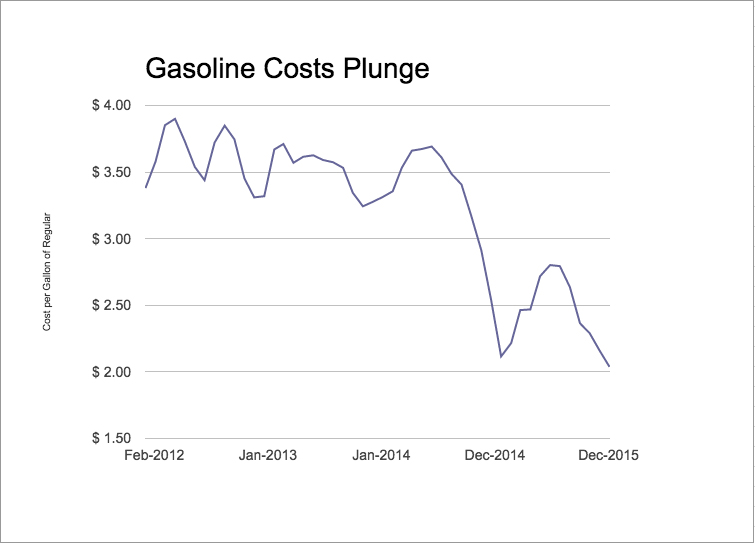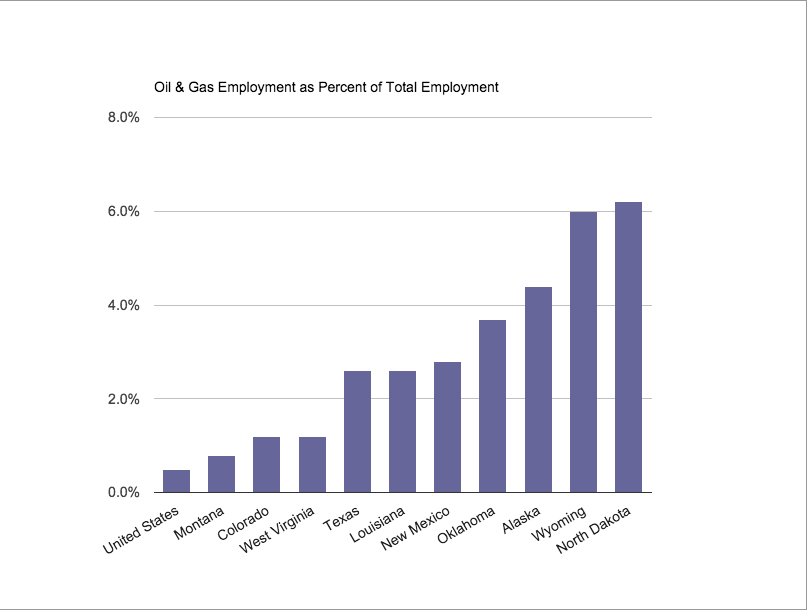Financial Services News - Jan. 11, 2016
Upcoming Events
Related News
Drop in Energy Costs Nets Benefits...Mostly
With the rout in oil and natural gas prices stretching on for more than 7 months, end users certainly are feeling the benefits. Consumers are enjoying gasoline averages at around $2 per gallon.
For someone accustomed to filling up once a week, this represents a savings of $30 per week — more than $1,500 each year. Furthermore, declining heating and cooling costs and more affordable air travel benefit all consumers.
More broadly speaking, the decline in energy costs has strengthened the economy in a potentially more important manner. In a globalized economy, U.S. manufacturers compete with producers from regions of the world with far more lax government regulations and a supply of labor far less costly than in the U.S. Our dramatically increased domestic energy supply along with the corresponding shift to lower prices provides our manufacturing sector a fighting chance to thrive in this global environment.
But despite the broader benefits from this, negative impacts from the plunge in energy costs are being felt or anticipated in certain regions and sectors. Each month, the Federal Reserve Bank of Dallas releases its Texas Manufacturing Outlook Survey. Index readings above “0” indicate expansion while those below “0” indicate contraction.
In December, the “general business activity” component of the survey sank to minus 20.1, the 12th month of contraction. In addition, the “new orders” component dropped to minus 8.9, for the 11th time in the past 12 months. These indicators suggest the Texas manufacturing sector is experiencing weakness not seen since the depths of the Great Recession.

Of course, many factors other than oil prices are contributing to this weakness. But a review of some of the comments highlighted in the report from factory respondents is enlightening. For instance, a metal fabricating product manufacturer says, “The price of oil is really impacting our customer base and, in turn, purchases of our product. It is getting ugly.” In addition, a machine manufacturing factory reports, “Weak oil and natural gas prices are having a material adverse effect on our business.”
Although anecdotal, these comments combined with the survey results suggest a continuation of tepid economic growth in the U.S. is quite possible in 2016.
Fortunately, the negative impacts from lower oil prices should be concentrated in states with higher levels of employment related to the oil and gas producing sectors.
A 2015 report by Wells Fargo Securities analyzed data from the U.S. Department of Labor in order to show which states rely most on the oil and gas industry for employment.
Although only one of every 200 workers across the nation are employed in this sector, nine states at the time of the analysis experienced rates at least twice that high. In these states, the steep drop in energy prices will likely lead to diminished rig counts, lessened business activity, slashed capital expenditures and slower employment growth.
Financial officers in states and counties with higher dependence on the energy sector should be cognizant that tax revenues may be constrained until a rebound occurs. This demands fiscal prudence and a refocusing on essential government services.
Furthermore, government officials should pursue a taxation and regulatory environment that attracts business development across all sectors—including energy. Fostering a business-friendly climate ensures that opportunities for prosperity will abound regardless of performance of any one industry.
Griffith is a general program manager with NACo’s Financial Services Center. You may reach him at 202.942.4238 or jgriffith@naco.org

Attachments
Related News

NACo to kick off 2026 Legislative Conference, unveil ‘We Are Counties’ message
More than 2,000 county officials from across the nation are visiting Washington, D.C., for NACo 2026 Legislative Conference, at the Washington Hilton Feb. 21-24.

Commissioner fights for ‘forgotten’ township
Yolanda Smith Charles has championed a small municipality in her Oakland County, Mich. district that has been dismantled as others grow.

Local government organizations send letter in support of the BASICS Act to congressional leaders
On February 16, nearly 80 state associations of counties and municipal leagues representing local governments in all 50 states sent a letter to the leaders of the U.S. House Committee on Transportation and Infrastructure and the U.S. Senate Committee on Environment and Public Works expressing their support for the Bridges And Safety Infrastructure for Community Success (BASICS) Act (H.R. 7437) and urging its inclusion in the next surface transportation reauthorization bill.